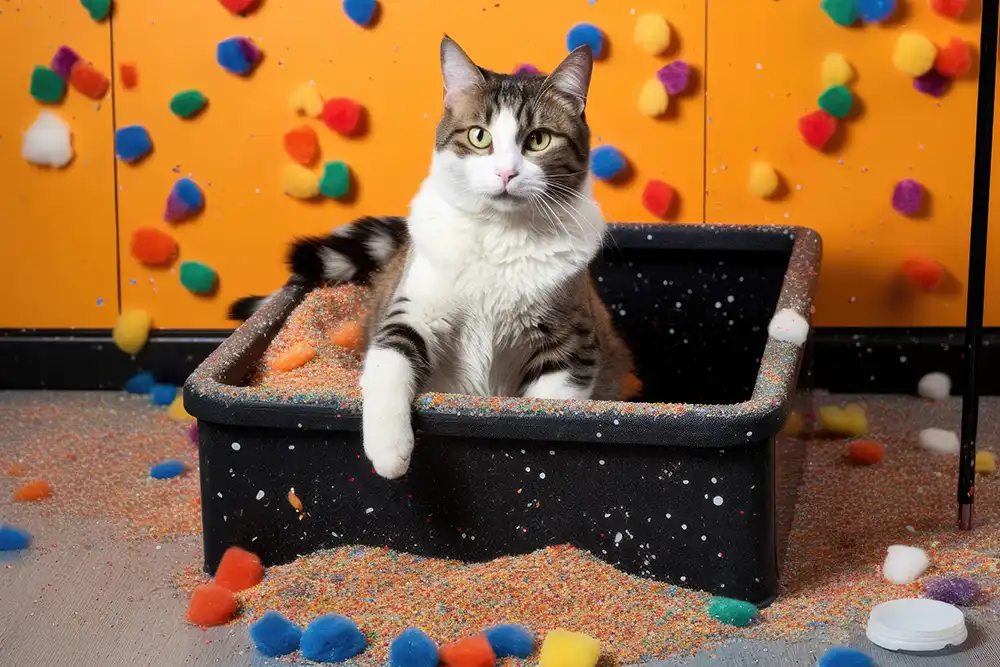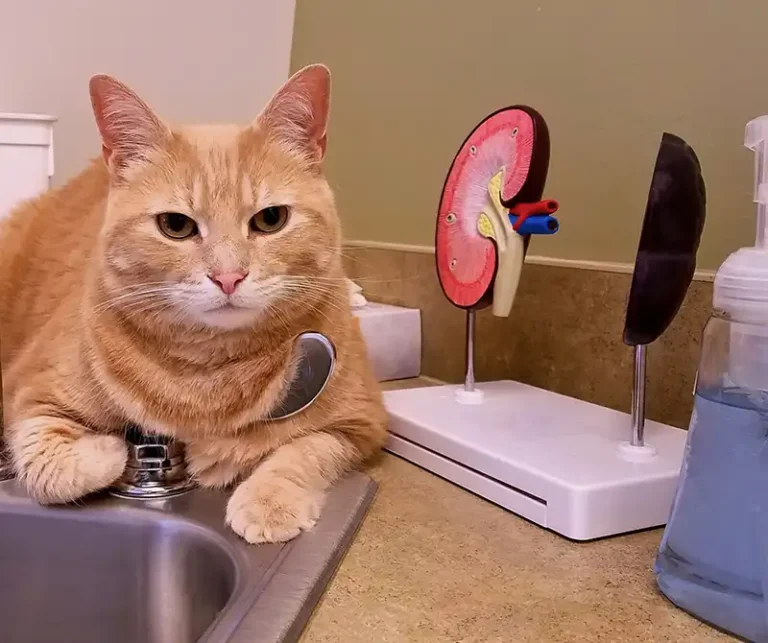Effective Solutions for Cat Pooping Outside Litter Box Dilemmas
Is your cat pooping outside the litter box, leaving you baffled and seeking solutions? You’re not alone. This article dives into the common reasons behind such feline behavior, including “cat pooping outside litter box” issues, and outlines practical steps you can take to resolve it. From health-related concerns to environmental factors, learn how to address and prevent these accidents to restore harmony in your home.
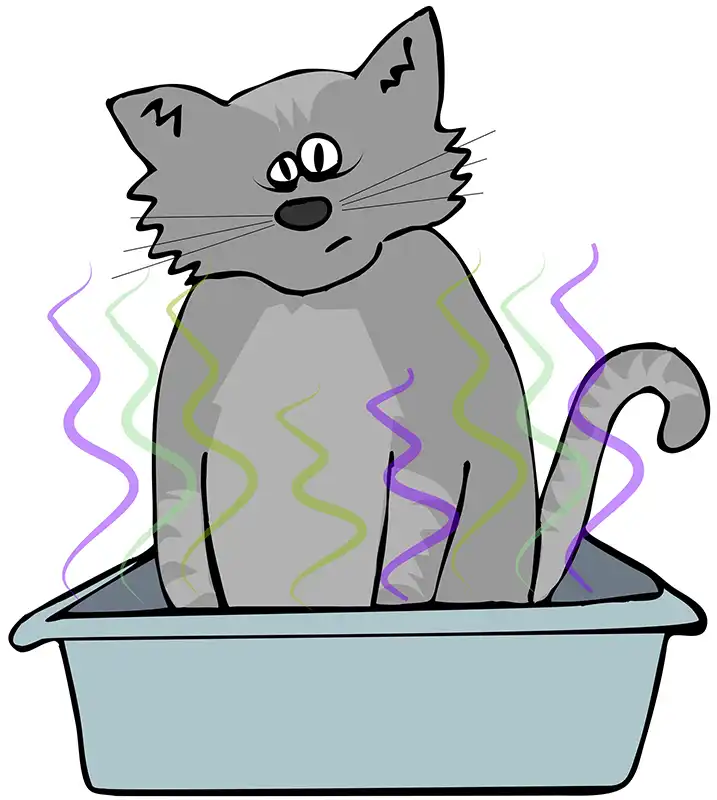
Key Takeaways
- Cats may avoid using their litter box due to various factors such as health issues (arthritis, constipation, urinary tract infections), stress from environmental or routine changes, and undesirable litter box conditions like cleanliness or litter box location.
- Strategies to encourage litter box use include keeping a clean and easily accessible box, situational placement away from high-traffic areas, having multiple boxes for households with multiple cats, and testing different litters to avoid territorial disputes.
- Persistent litter box aversion may require consultation with a veterinarian to rule out health conditions or behavioral issues. Clean accidents with an enzyme-based cleaner to prevent recurrence.
Understanding the “Why” Behind Your Cat’s Litter Box Aversion
Trying to find the source of why your cat is shunning its litter box can be perplexing. Cats are complicated animals, and various variables, including health difficulties, environmental conditions, or anxiety, could affect their behavior. Consider all these factors when determining what may lie behind a feline’s reluctance to use its tray for disposing of excrement.
Health Conditions as a Culprit for Cat Litter Box Issues
Pet owners must be aware of any health issues their cats may have that could cause litter box aversion. A few common ailments associated with this are arthritis, constipation, urinary tract infections, bladder stones, or inflammatory bowel disease, all of which can make using the litter box a challenging experience due to discomfort during elimination.
Suppose your feline companion appears reluctant around its designated area. In that case, it’s best practice for concerned pet parents to consult their vet regarding potential illnesses. Proper medical advice can make you feel much better about how best to treat your feline companion.
Monitoring behavior and seeking professional help if you suspect something isn’t quite right will ensure that our furry friends remain comfortable when utilizing the litter box as an appropriate way of eliminating waste material!
The Impact of Stress on Feline Bathroom Habits
When you make changes to your cat’s routine or environment, it can be very stressful for them. Your cat might exhibit different behaviors – one being a refusal to use their litter box if another pet gets added to the household. To make this transition smoother and less traumatic for your feline friend, offer more love and attention to reduce stress levels.
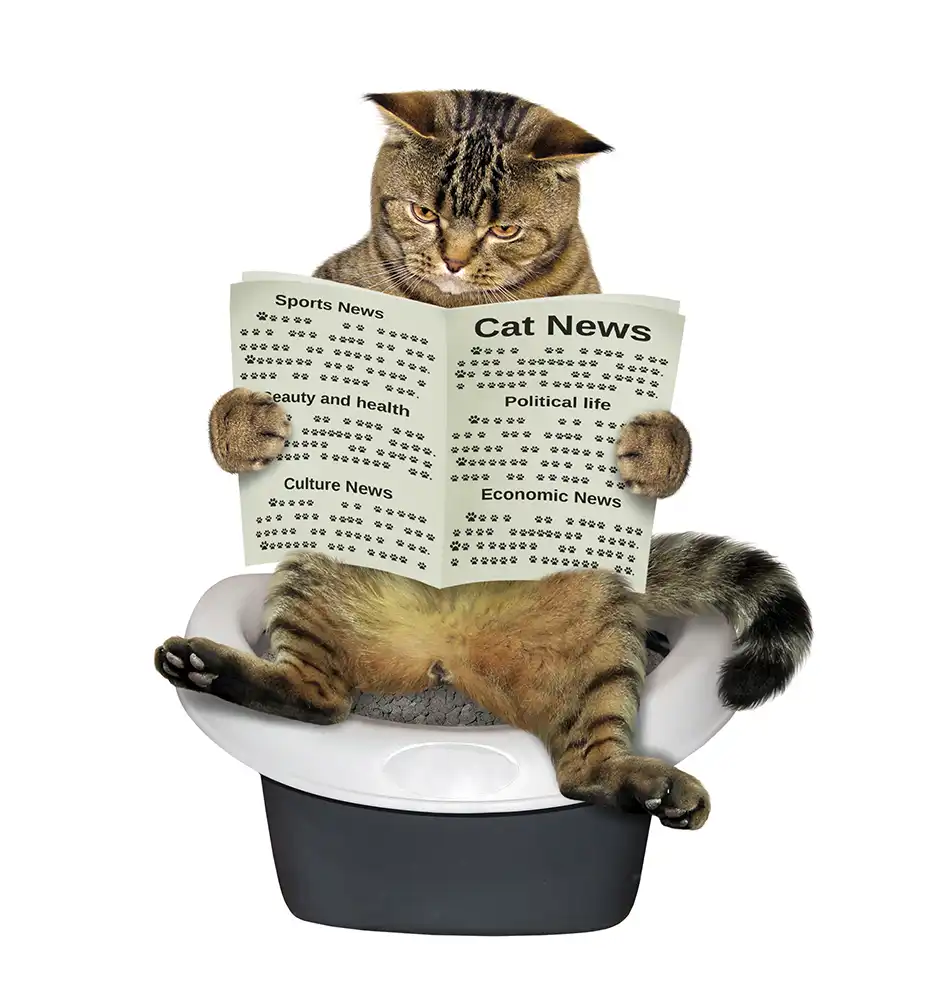
Environmental Factors Influencing Litter Box Behavior, Including Cat Litter Box Location
The litter box environment can affect its usage a great deal. A dirty and inappropriate location might make your cat avoid it, so keep the area clean and in an isolated spot with low traffic for maximum appeal. In multi-cat homes, provide sufficient boxes to prevent overcrowding, which can lead most cats to stop using them.
Strategic Approaches to Resolve Inappropriate Pooping
If you have noticed your cats’ disinclination to use the litter box, you can use some strategies to fix this problem. These involve keeping the litter clean and appropriately situated and offering multiple boxes if there is more than one feline around. All to overcome any aversion toward using it.
Ensuring a Clean and Inviting Litter Box To Avoid Pooping Outside The Box
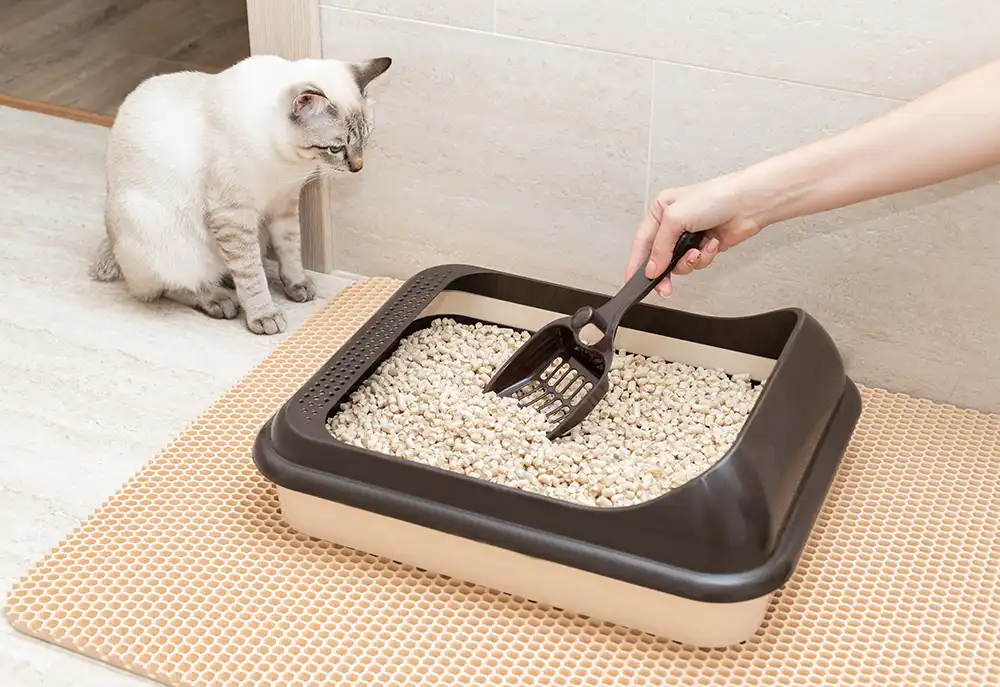
Cats are known for their need for cleanliness and can be encouraged to use the same litter box by ensuring it is always sparkling. Filling a fresh litter box with cat-friendly materials like kitty litter should help establish an inviting routine bathroom spot for your cats.
It’s essential to avoid a dirty litter box and ensure if you have a dirty litter box that you clean it up to remedy issues with cat poop outside the litter box if it occurs.
Regularly replacing soiled contents and washing with hot water & unscented soap or baking soda will ensure that the container stays hygienic and encourage continued utilization from your furry friends!
The Significance of Litter Box Placement
The situation of the litter box for your cat is critical. It should be in a secluded, low-traffic area, separate from food and water. This provides privacy and ease of access for your cat when using it.
Placing it too close to noisy places or frequent foot traffic will make them hesitant to use their designated potty spot at all times due to feeling intimidated by such activity around them. Hence, maintaining a good placement of its litter box can help ensure your pet utilizes said amenities without stress or hassle.
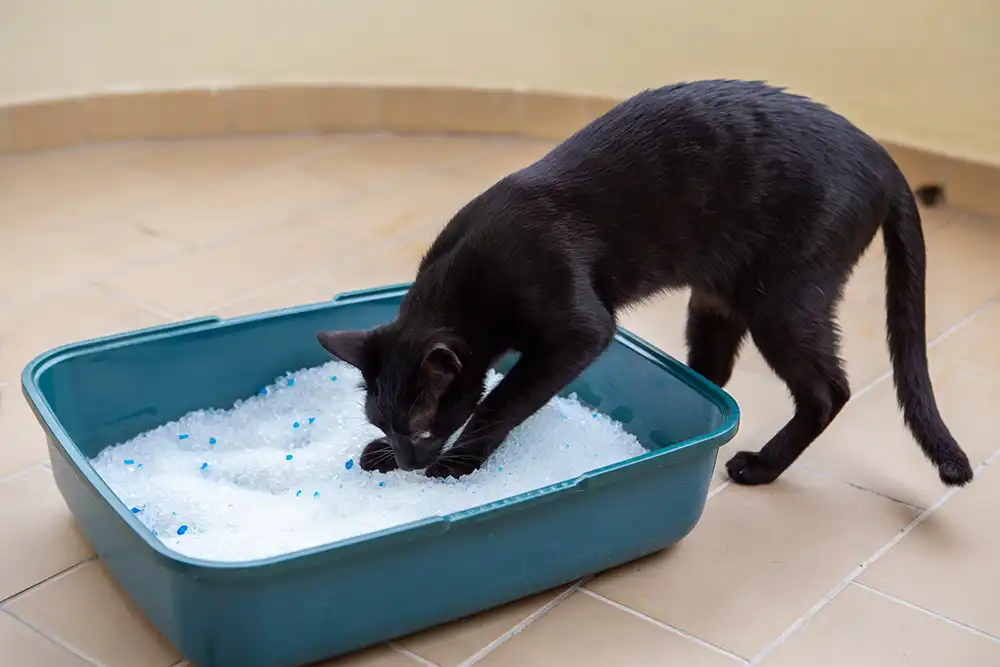
The Role of Multiple Litter Boxes for Multiple Cats
For households that have more than one cat, having the right number of litter boxes can help reduce issues related to territorial disputes, pooping outside the litter box, and when they avoid their designated area for toileting. To ensure you provide two or more cats with adequate litter boxes, we recommend three litter boxes, one litter box per cat, plus one litter box as a bonus.
Be sure to place several around the home, but avoid arranging them too close together to prevent disputes. Most cats prefer enough litter boxes or a larger litter box as opposed to one, as they are territorial creatures. A one-cat to one-liter box rule will work in most cases; if not, try adding an additional one. Other cats may prefer more, so try to see what works best.
Changing the cat litter daily may also be necessary so the other cat feels comfortable. Many cats may be ok with a single box for their poop, while other cats may need more personalized experiences. Experiment and see what works best for your household and your cat’s own habits.
Tailored Adjustments for Specific Situations
When changes occur in the home, it is not uncommon for cats to have difficulty with their litter box habits, house soiling, or going to the bathroom in the same places. To help your cat adapt, tailor these adjustments accordingly. In this way, you can protect against house soiling involving your feline’s use of its litter box. New litter, replacing old litter, or adding a new litter box may also be needed to help with specific cat likes or preferences.
Addressing the Arrival of New Family Members, Second Cat or New Pet
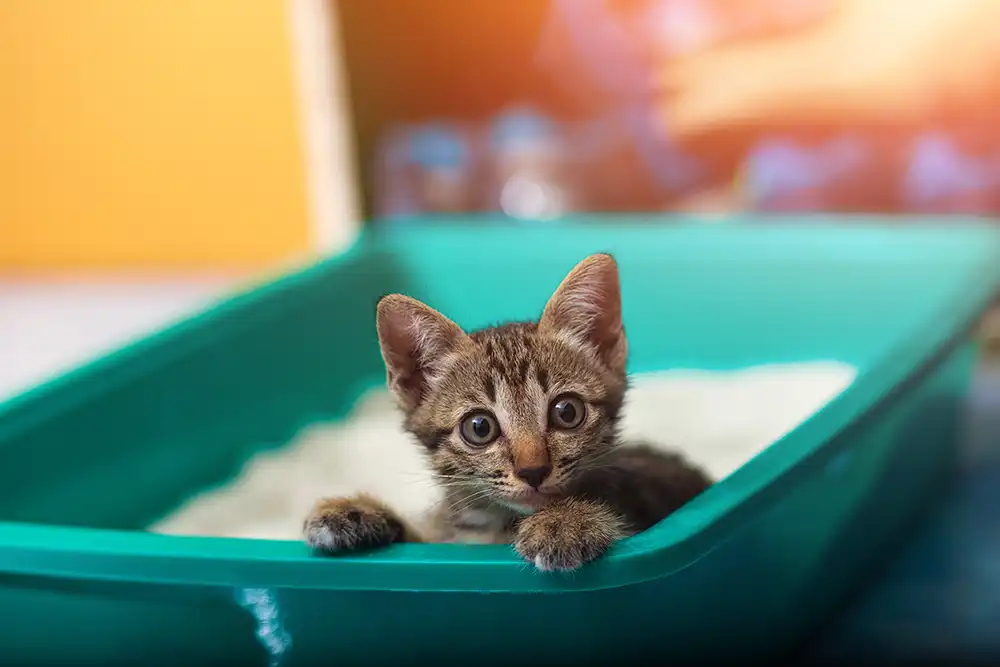
When a new family member is welcomed, such as an infant, new pets or cats, it can disrupt your cat’s regular routine and cause them to feel anxious. Giving your cat additional attention and comfort can help your feline adjust better during changes.
Changes should be gradual in order for things to go more smoothly for your kitten while minimizing any shock from sudden alterations.
Acknowledging a other pets’ presence will help them acclimate more easily to their home environment without too much stress on either side.
Adapting to Changes in Household Dynamics
During periods of disturbance to household routines, cats can become stressed and develop habits of pooping outside the litter box. To help your cat remain calm during transitions, we recommend maintaining consistency in their routine as much as possible. Many cats need extra attention and safe areas so they feel secure.
Creating a particular space just for them will ensure that any alterations in routine don’t result in an aversion towards its litter tray/box setup.
Older cats may also experience hardship with changes in routine. If you notice an old cat pooping outside the litter box, consider moving the litter box to a new location and provide positive reinforcement to encourage positive results.
Expert Advice: When to Consult a Veterinarian
Despite trying various solutions, if your cat is still pooping outside the litter box, consulting a professional may be necessary. It could be that some underlying health issues, digestive problems, or behavioral issues are causing this aversion and causing the behavior of pooping outside the litter box. Veterinary medicine can help identify an underlying illness to get your cat back on track with its proper poop routine and use of its preferred litter container.
Identifying Signs of An Underlying Health Issue
Keeping an eye on your cat to spot any health difficulties is essential in addressing litter box challenges. If you notice changes with regards to your cat’s poop or how the animal moves around, it could suggest an underlying medical condition such as constipation, arthritis, or even a urinary tract infection which may lead to them not using the litter box or litter boxes properly.
So, if this happens, talking to a vet about your cat for an accurate diagnosis of a health problem and treatment is necessary. Depending on your cat’s poop problem, changes in diet, including changing to wet food, may help alleviate these problems.
Behavioral Cat Signs That Warrant Professional Insight
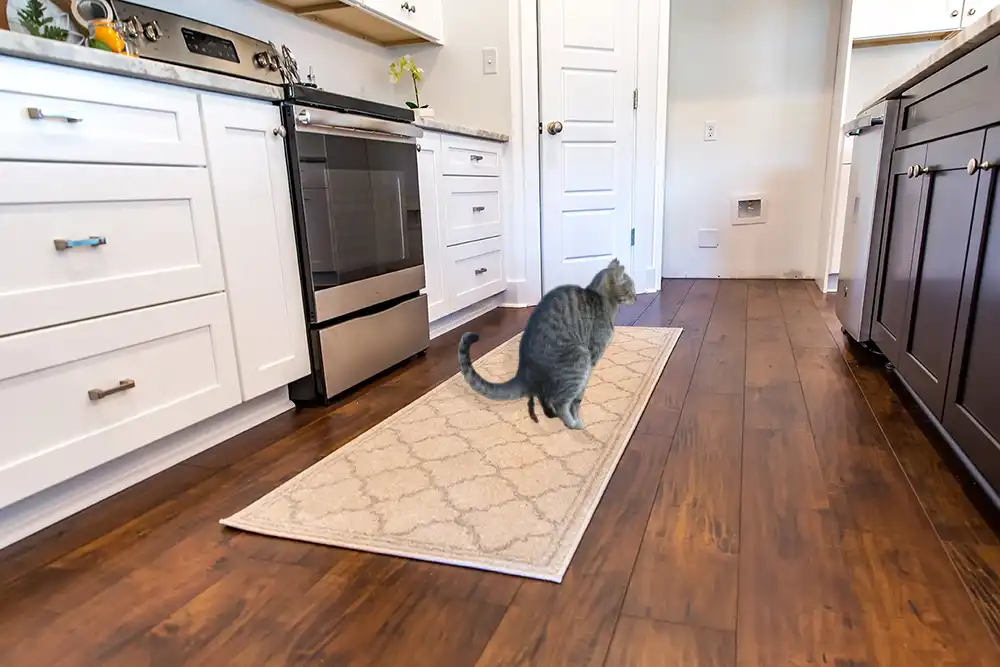
The “pooping outside the litter box” issue of your cat might be more complicated than switching out litter boxes. Behaviors such as shunning the litter box, scratching a lot, or obsessive mannerisms can mean that professional assistance is required. Vet services and animal experts offer personalized treatments if your cat continues undesirable behavior. Your vet can design a program to tackle these problems for your cat and litter box needs.
Practical Cleanup Tips for Cat Accidents Outside the Litter Box
No matter how hard you try, there is still a possibility that your cat will be pooping outside the litter box. Proper cleaning tools and methods can help you take care of these incidents quickly to prevent reoccurrence. Adding unscented litter in the relevant area can also prevent it from happening again. Depending on litter type, scented litter can cause some cats to poop outside the litter box. As a general rule, unscented litter can pose fewer problems, and be sure nothing will block access to its litter box.
Choosing the Right Cleaning Products for Cats
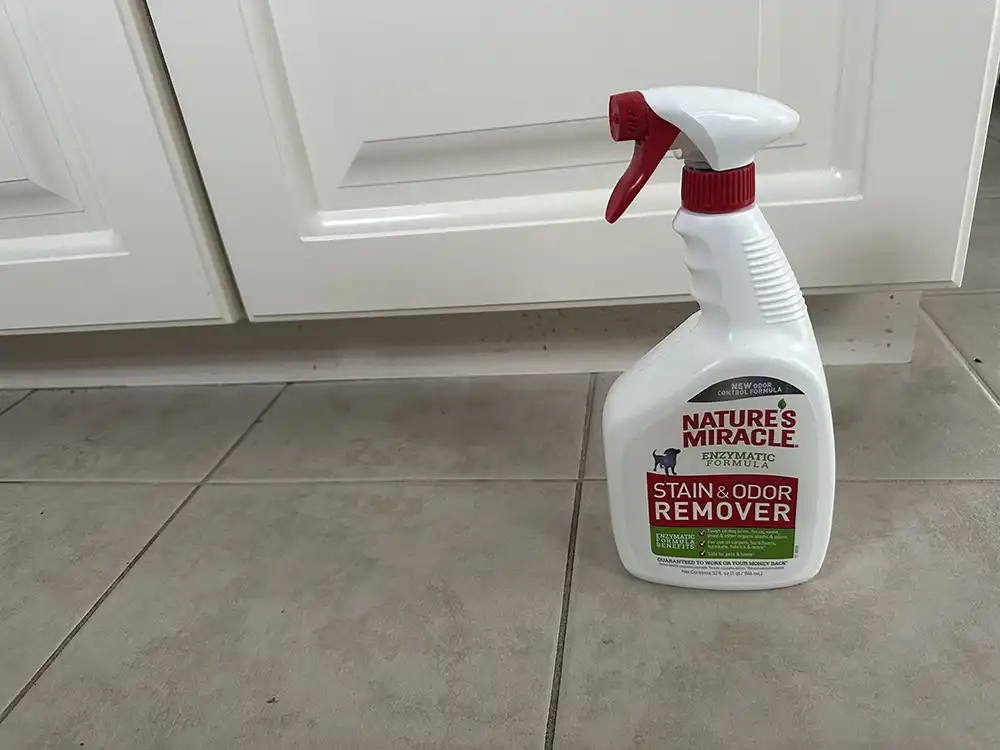
Enzyme-based cleaners provide an effective way of removing stains and odors caused by cats poop. These unique cleaning products work to break down the molecules in cat excrement, making it much easier to get rid of any odor or residue left behind. As well as being efficient, these cleaners are non-toxic and biodegradable. You can use them safely around cats without endangering them with toxic chemicals.
Preventing Repeat Incidents
Thoroughly cleaning the area where an accident occurred is key to preventing your feline from repeating their mistake. An enzyme cleaner can efficiently remove waste and odor, making them less likely to return to the same spot. Delving into what caused these accidents in the first place could also help deter future occurrences.
Summary
To address the problem of cat litter box aversion and cat poop problems, first, determine what exactly causes this behavior. Possible factors include medical issues or stress-related and environmental reasons, which you can address by keeping a cleanly placed litter box, providing multiple boxes for households with several cats, and consulting an experienced veterinarian if necessary.

